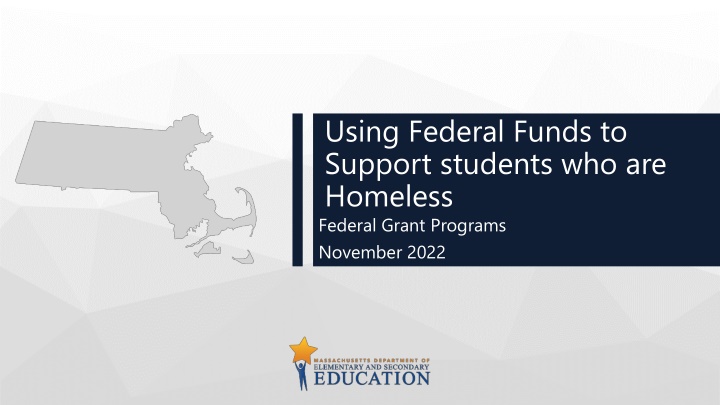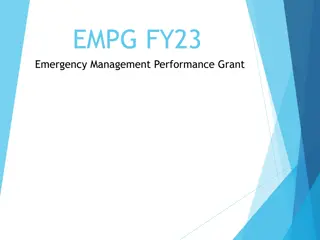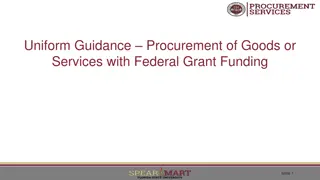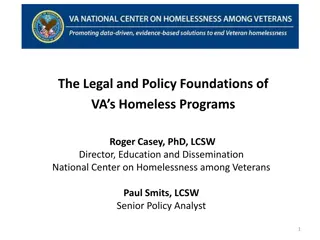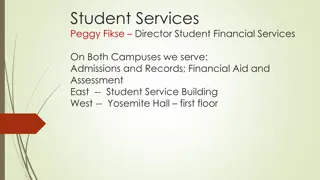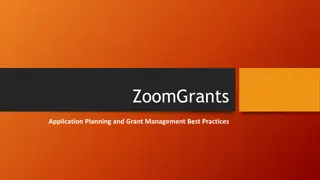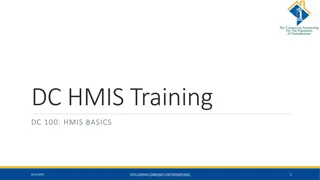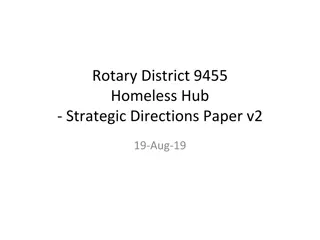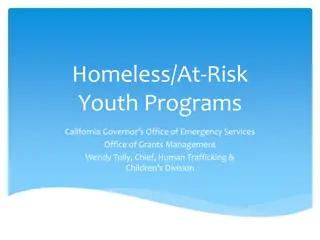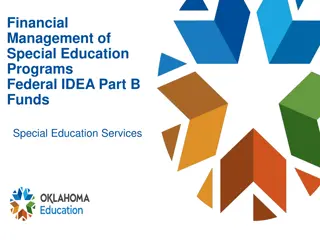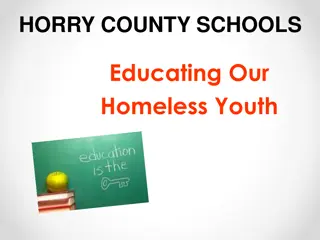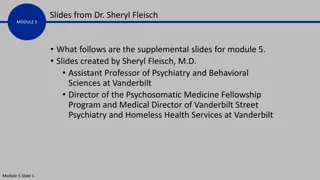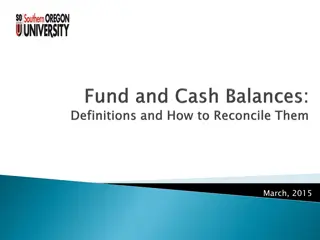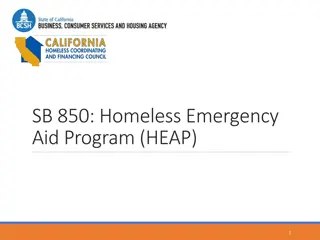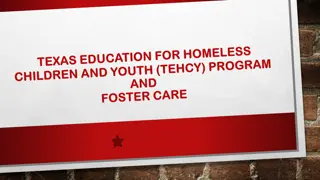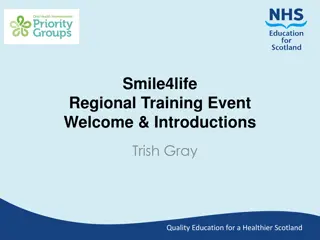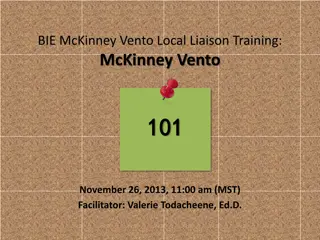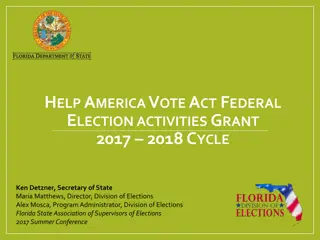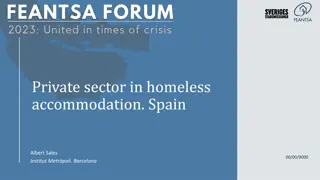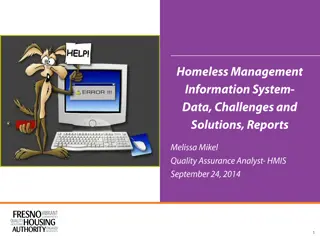Supporting Homeless Students with Federal Funds - Grant Programs November 2022
Students experiencing homelessness face various challenges affecting their education, such as food insecurity, lack of healthcare services, and disconnection from family and community. The presentation highlights the collaboration between federal programs and funding to support homeless students, particularly those in migratory families. It addresses the impact of homelessness on education, including poor attendance, learning difficulties, social isolation, and low graduation rates.
Download Presentation

Please find below an Image/Link to download the presentation.
The content on the website is provided AS IS for your information and personal use only. It may not be sold, licensed, or shared on other websites without obtaining consent from the author.If you encounter any issues during the download, it is possible that the publisher has removed the file from their server.
You are allowed to download the files provided on this website for personal or commercial use, subject to the condition that they are used lawfully. All files are the property of their respective owners.
The content on the website is provided AS IS for your information and personal use only. It may not be sold, licensed, or shared on other websites without obtaining consent from the author.
E N D
Presentation Transcript
Using Federal Funds to Support students who are Homeless Federal Grant Programs November 2022
1 2 3 4 5 6 Welcome Building with Federal Funds Lynn Public Schools Content New Bedford Public Schools Your Questions Contact Information & Resources
1 Welcome
Welcome Amy Chruniak, Lynn Public Schools Julie Mador, New Bedford Public Schools Sarah Slautterback, DESE Our Focus Collaboration between federal programs and funding to support students who are homeless; in particular students in families that are migratory and homeless. 4 Massachusetts Department of Elementary and Secondary Education
2 Building with Federal Funds
A little context Homelessness is a journey and rarely happens overnight. Students may also experience: Food insecurity Lack of medical, dental, and mental health services Loss of connection to family, friends, community Many students experience homelessness with family members; all of whom are impacted too. Parents, siblings, and others will show signs of stress and even trauma. Other students are out of their homes on their own creating additional concerns they are unaccompanied. 6 Massachusetts Department of Elementary and Secondary Education
Migratory Families Migratory families and youth work in agriculture or fishing industries and travel with the crops. (Title - 1 Part C) Oranges -> Strawberries -> Tobacco -> Blueberries Florida North Carolina Massachusetts Maine These families and youth often share the housing of others and are covered by McKinney-Vento. 7 Massachusetts Department of Elementary and Secondary Education
The impact of homelessness on education . Poor attendance Inability to focus and learn Educational gaps Social isolation Behavior and health related problems Low proficiency rates High drop out rates Low graduation rates More poverty 8 Massachusetts Department of Elementary and Secondary Education
Impact of Homelessness High mobility also impacts the teacher, classmates and the others in the school. It can be a form of secondary trauma. Students coming and going can disrupt learning even for the students who are stable. Classmates ask Could that happen to me ? Teachers say I ve been worried about her and ask Is he going to be ok? Is he safe ? 9 Massachusetts Department of Elementary and Secondary Education
Resilience It is important to remember that as daunting as it looks students have remarkable resilience. Family can be a source of encouragement. They may have an island of excellence to build on. The connection with a teacher or staff member may be just what they need each day. Perhaps they are part of a team that depends on them. We need to support their source of resilience. 10 Massachusetts Department of Elementary and Secondary Education
Federal funds available to serve students who are homeless Several federal programs serve students who are homeless or in migratory families, and others encourage the inclusion of students who are homeless. o Title 1 Part A- and Part C o McKinney-Vento (Title IX Part A) o American Rescue Plan (other crisis related grants) o 21stCentury Learning Centers are inclusive of students who are homeless. 11 Massachusetts Department of Elementary and Secondary Education
Title 1 Homeless Reservation The homeless liaison and the Title 1 director must coordinate The reservation must address the needs of students who are homeless (this may include Migratory students who are homeless). The reservation can be calculated as a lump sum, cost of specific services (tutors, counselors), or on a per pupil basis 12 Massachusetts Department of Elementary and Secondary Education
McKinney-Vento Homeless Education Grants are ocompetitive othree-year continuation grants oSignificant number of students oHigh quality programming oFlexible use but do not allow for food, gift cards, or housing 13 Massachusetts Department of Elementary and Secondary Education
21stCentury Learning Centers Grants for districts and community organizations oAfter/out of school programming oWelcome 14 Massachusetts Department of Elementary and Secondary Education
American Rescue Plan Homeless Children and Youth ARP-HCY Grant is: oa one-time multi-year oallocation grant oVery flexible funding oIncluding food, gift cards (cautiously), temporary housing (upto 3 nights) Other grant opportunities include Impact Aid after Hurricane Katrina and the natural disasters of 2017 that causes homelessness. These tend to be one time flexible allocation grants. 15 Massachusetts Department of Elementary and Secondary Education
Collabortation When working across programs and funding streams collaboration it the key. Today Amy Chruniak and Julie Mador are here to share how they have been working across the homeless and migrant education programs and leveraging funding to support a growing population of student in migratory families that are homeless. 16 Massachusetts Department of Elementary and Secondary Education
3 Lynn Public Schools
Lynn Public Schools Lynn Public Schools and Massachusetts Migrant Education Program Partnership Amy Chruniak, Homeless liaison 18 Massachusetts Department of Elementary and Secondary Education
Migrant students in Lynn Lynn Public Schools was eligible for additional funding through the McKinney- Vento Grant based on the number of migrant students in the district. As of May 24, 2022, when Lynn applied for the additional funding, there were 89 students enrolled in the Massachusetts Migrant Education Program, with more than half of these students qualifying under McKinney-Vento as well. As of October 27, 2022, there are 64 students enrolled in the Massachusetts Migrant Education Program with another 13 eligible due to District of Residence (total of 77). These numbers change daily due to new enrollments and new families being identified as MMEP eligible. Massachusetts Department of Elementary and Secondary Education
Identification of Migrant Students Per collaboration with MMEP, Lynn Public Schools has enhanced their identification of potentially eligible MMEP students. At the point of registration, each family is asked to fill out the Migrant Screener Survey, even if they do not think they are eligible. MMEP provides LPS with an updated listing of migrant students upon request and no fewer than two times during the academic year to ensure all students a properly identified in our student information system. Emily Hoffman, Migrant Education Program Director, offers trainings to district staff such as Welcome Center Clerks. She also attends the district s professional development series on homelessness. Massachusetts Department of Elementary and Secondary Education
Use of Funding Regarding successes of migratory students related to support services, Lynn Public Schools and MMEP were able to allocate money in the McKinney-Vento grant for homeless migrant students to attend summer programs, enrichment programs, and tutoring programs. After assessing needs and speaking with families, MMEP and Lynn Public Schools feel that it continues to be in the best interest of the students to go to programs with their peers, rather than sending them out of district to other programs. This will be accomplished by having supplemental academic support for migratory and homeless students through existing programs in the district and will allow students to build peer relationships and better connect to their schools and communities. An example of this success- Last year, LPS and MMEP collaborated and provided camp scholarships for around 30 migrant students, totaling close to $12,000. These students were also provided materials for summer camp. Massachusetts Department of Elementary and Secondary Education
Use of Funding (2) MMEP has suggested finding existing programming in the area focused on leadership skills for middle school students. MMEP support staff and the Homeless Education Liaison have met with staff from various summer program offerings in the area and through these meetings are working on expanding various partnerships. Funds have also been utilized to purchase school supplies, such as backpacks/notebooks, winter kits, household supply kits, and hygiene kits which are housed at the Welcome Center and dispersed to homeless and migrant students alike who are in need. The number of MMEP students enrolled in our high schools is expected to rise, and they will need additional support to help them be more involved, connected, and supported. LPS and MMEP would like to engage staff at the high schools to discuss what this support should/could look like. Massachusetts Department of Elementary and Secondary Education
Plan to Increase Communication with Funding Support A lesson learned this past school year was that more effective communication would be beneficial between MMEP and Lynn Public Schools. The MMEP Program Coordinator and Homeless Education Liaison have discussed a potential solution to improve this communication. LPS plans to implement a Migrant Point Person at 9 high-incident schools and 1 at the Welcome Center. At the low-incident schools, the Homeless Point Person would take on the role of also including migratory students. As of now, migrant students have access to the Homeless Point Person (who is typically a school clinician). The goal of the Migrant Point Person is to assist MMEP support staff in establishing relationships with the schools which would in turn provide more support for migrant students and bridge the gap between home and school. This would be a stipend position utilizing funding from the McKinney Vento Grant. Massachusetts Department of Elementary and Secondary Education
Additional Support through American Rescue Plan MMEP has identified that while students in Kindergarten through grade five would typically attend offered after school programs, there is still a population of migrant students in middle school and high school that have difficulty accessing after school programming due to transportation constraints. LPS and MMEP have partnered to access MBTA bus passes for these students to attend after school programming. Currently, 19 students have been given these passes to attend the Boys and Girls Club. Massachusetts Department of Elementary and Secondary Education
4 New Bedford Schools
New Bedford Public Schools Julie Mador, Registrar, Homeless Liaison, Regional Liaison and Foster care point of contact 26 Massachusetts Department of Elementary and Secondary Education
5 Your Questions
Q&A Questions? Thoughts? Other examples? 28 Massachusetts Department of Elementary and Secondary Education
6 Contact Information & Resources
Resources DESE Educational Stability Team DESE Education Stability Website: http://www.doe.mass.edu/sfs/edstability.html Technical Assistance: Problem Resolution Services, 781-338-3700 Staff: Christine Cowen, Migrant Education, Military Connected Students 781-338-6301 Christine.H.Cowen@mass.gov Lisa Hanafin, LEA Assignment Coordinator 781-338-3367 Lisa.Hanafin@mass.gov Kristen McKinnon, State Foster Care Point of Contact 781-338-6306 Kristen.A.McKinnon@mass.gov Jim Morrison, DCF Education Manager and Point of Contact 617-748-2340 James.J.Morrison@MassMail.State.MA.US Bridget O Shaughnessy, Education stability Specialist Bridget.G.OShaughnessy@mass.gov Sarah Slautterback, Homeless Education State Coordinator 781-873-9522 Sarah.E.Slautterback@mass.gov 31 Massachusetts Department of Elementary and Secondary Education
THANK YOU Educational Stability, Office of Student and Family Support 781.338.3010 achievement@doe.mass.edu www.doe.mass.edu/sfs/
